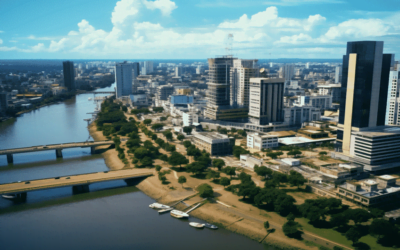You know that feeling when you’re about to embark on a new adventure with your trusty drone, but the nagging question keeps buzzing in your mind, “What are the drone laws in Malta?”
It’s a concern that every drone enthusiast or professional pilot has faced at one point. Well, rest assured, you’re not alone. We’ve all been there, curious and perhaps a little perplexed about navigating the skies with our drones in a foreign land.
I’ve been there too, and I can tell you that the answer to your query lies within these digital pages. The journey I embarked on to bring you the latest insights on Malta’s drone regulations was no small feat.
It involved diving into the world of drone laws, consulting experts, and meticulously studying the guidelines set forth by the Malta Civil Aviation Directorate. I’ve done the legwork so that you don’t have to. Together, we’ll uncover the nuances of Malta’s drone laws and regulations and get you ready for your next drone flight.
So, if you’re itching to fly your drone over the beautiful landscapes of Malta or you’re planning a professional aerial shoot, you’ve come to the right place. In this article, we’ll unravel the intricacies of Malta’s drone laws and provide you with all the answers you seek.
Ready to navigate the Maltese skies without a hitch? Well, keep reading, because your solution to understanding Malta’s drone laws starts right here. Let’s dive into the world of “Malta Drone Laws” together
Overview of Drone Regulations in Malta

As I delved into the fascinating realm of Malta’s drone laws, I couldn’t help but admire the precision and thoughtfulness behind their regulations.
Understanding how these regulations work is like deciphering a complex puzzle that ensures safe and responsible drone flights in this beautiful Mediterranean nation. Let’s start by unveiling the key elements that shape Malta’s drone laws.
Agencies responsible for regulating drones in Malta
Malta, like many countries, entrusts the responsibility of regulating drones to a dedicated authority. In this case, it’s the Malta Civil Aviation Directorate (CAD) that takes the reins.
This agency plays a pivotal role in ensuring that drone operations within the country adhere to established rules and guidelines.
When it comes to Malta’s skies, CAD takes charge, overseeing the safety and compliance of drone flights.
They’re the ones you’d turn to for guidance, information, and updates regarding drone regulations in Malta. Having a single authority in charge ensures clarity and consistency in drone laws, which, I must say, is quite reassuring for enthusiasts like us.
Reference to the European Union Aviation Safety Agency (EASA)
While Malta has its own set of drone regulations, it’s essential to remember that it’s also a part of the European Union.
This means that Malta must adhere to the drone regulations set forth by the European Union Aviation Safety Agency (EASA). In addition to Malta’s specific rules, EASA provides a broader framework that influences drone operations across the European Union.
EASA’s regulations offer a more extensive perspective on drone safety, ensuring a harmonized approach within the EU. As drone enthusiasts, this means that when you’re flying your drone in Malta, you’re not just following local laws but also aligning with a larger, region-wide framework designed to promote safety and standardization.
Categorization of drone operations in Malta (Open, Specific, and Certified)
Now, let’s dive into the heart of Malta’s drone regulations: the categorization of drone operations. Malta, like many other countries, classifies drone operations into different categories, each with its own set of rules and requirements. These categories are Open, Specific, and Certified.
The Open category is your go-to if you’re conducting low-risk drone operations. It’s the least complex category and involves rules like a maximum takeoff mass of less than 25kg and flying within the visual line of sight.
Then there’s the Specific category, which comes into play for moderate-risk operations and might require specific authorizations based on operational risk assessments.
Finally, there’s the Certified category, mainly for high-risk operations, where certification of the drone and a licensed remote pilot are necessary, particularly if your drone can carry people.
Understanding these categories is crucial because it determines the rules you need to follow for your specific drone operation. It’s like fitting puzzle pieces together, and once you do, you can ensure a safe and compliant flight experience in Malta’s picturesque skies.
Also Read: Mali Drone Laws 2024
Drone Categories in Malta

Malta’s drone laws are like a finely woven tapestry, and to understand them better, we need to explore the different categories they’ve established.
Think of these categories as pathways through which you navigate the skies with your drone. Let’s start with the Open category, where low-risk adventures take flight.
Open Category
The Open category is the entry point for most drone enthusiasts. It’s where the adventure begins, and the rules are, dare I say, pleasantly accommodating. In the world of low-risk drone operations, it’s all about letting your drone spread its wings without too many restrictions.
Requirements and rules for low-risk drone operations
In the Open category, you’ll find rules that are designed to keep things straightforward and safe. Your drone must have a maximum takeoff mass of less than 25kg, ensuring that it’s not a heavyweight in the skies.
The altitude is capped at 120 meters, and this keeps your drone within a comfortable and safe flying range. As a responsible pilot, it’s essential to maintain a visual line of sight (VLOS) with your drone at all times, ensuring that you can see and control it throughout the flight.
These rules make the Open category an excellent choice for those who want to explore Malta’s breathtaking landscapes and capture stunning aerial footage without excessive restrictions.
Maximum takeoff mass and altitude limitations
The Open category is all about striking the right balance. With a maximum takeoff mass of less than 25kg, it ensures that your drone remains manageable and poses minimal risk to those below.
Additionally, the altitude limitation of 120 meters keeps drone flights well below manned aircraft, maintaining the safety of the airspace. These limitations, though seemingly restrictive, actually contribute to a safer and more enjoyable drone flying experience in Malta.
Visual line of sight (VLOS) and safety measures
One of the golden rules of drone flying is maintaining a visual line of sight (VLOS) with your drone. This means that you should always be able to see your drone in the sky without the aid of binoculars or other devices.
The VLOS rule ensures that you have complete control over your drone and can react to any unexpected situations quickly.
As drone enthusiasts, we understand that safety is paramount, and adhering to this rule not only keeps us responsible pilots but also allows us to fully appreciate the stunning beauty of Malta from above.
Specific Category
Now, let’s shift our focus to the Specific category, designed for moderate-risk drone operations. In this category, the rules are a bit more complex, but they’re essential for maintaining safety and responsibility in the skies.
Rules for moderate-risk drone operations
The Specific category comes into play when you’re planning drone operations with a slightly higher level of risk. Here, you’ll need to obtain specific authorizations before your flight. This might involve operational risk assessments, which is a fancy way of saying that you’ll need to evaluate and mitigate any potential risks associated with your drone operation.
The goal is to ensure that even in more complex situations, safety remains a top priority. So, if your drone adventures in Malta require a bit more planning and consideration, the Specific category provides a framework to do just that.
Authorization requirements and operational risk assessments
To navigate the Specific category, you’ll need to seek specific authorizations, which can vary based on the complexity of your drone operation. These authorizations are obtained by conducting operational risk assessments.
In simpler terms, this means evaluating the potential risks of your flight and coming up with plans to mitigate those risks. It’s all about being well-prepared and ensuring that, even in more complex scenarios, you’re still operating safely and responsibly. While it may add an extra layer of planning, it’s a vital step in keeping our skies secure and open for drone enthusiasts like us.
Certified Category
The Certified category in Malta’s drone regulations is where the high-risk operations find their place. It’s the pinnacle of responsibility and safety, designed for operations that involve drones carrying people and other inherently dangerous activities. Let’s take a closer look at this category which leaves no room for error.
Regulations for high-risk operations, including those involving drones carrying people
The Certified category is where Malta’s drone laws take a step into the realm of the extraordinary. If your drone operations involve carrying people, you’ll find yourself squarely in this category. It’s a rigorous set of regulations and requirements that ensures the utmost safety, not just for the operators but also for the passengers.
The key feature of this category is the requirement for certification, both for the drone itself and for the remote pilot. This certification process ensures that the drone is in optimal condition, and the pilot possesses the necessary skills and qualifications to operate under these high-risk circumstances.
It’s an area where there’s no room for shortcuts or compromises. Safety is paramount, and every measure is taken to mitigate risks. While the Certified category may not be the most common for recreational drone pilots, it highlights the depth of consideration that Malta has given to drone operations, making sure that even in the most challenging scenarios, safety and compliance are upheld.
Also Read: Maldives Drone Laws 2024
Drone Flights for Residents of Malta

If you’re a resident of Malta and you’re eager to launch your drone into the skies, it’s essential to know the rules and regulations that govern your flights.
Malta’s drone laws are designed to ensure both safety and responsibility in the airspace. Let’s explore what you need to know when it comes to drone flights in Malta.
Hobbyist Drone Laws
Hobbyist drone pilots in Malta have the privilege of exploring the skies for recreational purposes. However, there are a few rules in place to keep the experience enjoyable and safe.
Licensing requirements
For hobbyist drone flights in Malta, you’ll need a hobbyist Malta drone pilot license. It’s not a complicated process, but it’s an essential one. This license helps ensure that you understand the basics of drone operation and the local regulations. It’s a way to make sure that every drone enthusiast is well-prepared for the adventures that lie ahead.
Registration for hobbyist drones
When it comes to drone registration, hobbyists in Malta should be aware that it’s required for drones weighing over 250g or those equipped with a camera.
This registration step ensures that the authorities have information about the drones that are taking to the skies. It’s all part of a comprehensive approach to keep track of drone activity and maintain safety.
Insurance requirements
Safety is a top priority in Malta’s drone laws, and that’s why it’s necessary for hobbyists to have insurance coverage for their drone operations.
While the specific coverage limits may vary, having insurance is a way to ensure that any unforeseen incidents are covered, giving hobbyists peace of mind as they explore the skies.
Commercial Drone Laws
For those in Malta who want to take their drone operations to a professional level, commercial drone laws come into play. These laws ensure that businesses can use drones for various purposes while adhering to safety and regulatory standards.
Licensing for commercial drone operators
Commercial Malta drone pilot license is a must for those looking to use drones for business purposes.
This license signifies a higher level of competency and ensures that commercial drone pilots are well-versed in the intricacies of drone operations. It’s a vital step to maintain the professionalism and safety of drone operations in a commercial context.
Drone registration for commercial operations
Similar to hobbyists, commercial drone operators in Malta are also required to register their drones.
This process ensures that the authorities have a record of the drones used for commercial purposes. It’s a straightforward yet crucial step in maintaining transparency and safety within the airspace.
Insurance considerations for commercial drone operations
When it comes to commercial drone operations, insurance is not just a consideration; it’s a requirement.
Drones used for business activities must have sufficient insurance coverage, ensuring that any potential liabilities are adequately addressed. This step is a vital aspect of responsible commercial drone operations, providing protection for both operators and the public.
Also Read: Malaysia Drone Laws 2024
Drone Laws for Visitors to Malta

Visiting Malta and eager to explore the Maltese skies with your drone? You’re in for a treat! However, there are essential rules and regulations you should be aware of to ensure a smooth and enjoyable drone experience during your stay.
Regulations for foreign visitors who wish to fly drones in Malta
If you’re a foreign visitor to Malta and plan to take your drone out for a spin, you’ll need to adhere to the local regulations.
Malta welcomes drone enthusiasts from around the world, but it’s crucial to remember that you’ll need to follow the same rules as residents when it comes to drone operations.
These regulations are in place to maintain safety and consistency in the airspace, ensuring that everyone enjoys their drone flights responsibly.
Licensing and registration requirements
Foreign visitors should be aware of Malta’s licensing and registration requirements. While the specifics may vary based on your home country, it’s crucial to understand that if you intend to operate a drone in Malta, you’ll need to comply with local laws.
This may involve obtaining a Malta drone pilot license and registering your drone if it meets the necessary criteria. It’s all part of the responsible drone culture that Malta encourages to ensure safety and accountability.
The importance of having drone insurance for tourists
While enjoying the stunning landscapes of Malta from the skies, it’s always a good idea to have drone insurance. Even as a tourist, having insurance coverage provides peace of mind.
It ensures that you’re financially protected in case of unforeseen incidents or accidents. Whether you’re capturing the beauty of Malta’s coastlines or taking breathtaking aerial shots, knowing that you have insurance in place can make your drone adventures even more enjoyable and worry-free.
Also Read: Malawi Drone Laws 2024
Government Drone Operations in Malta

When it comes to government drone operations in Malta, a unique set of regulations and requirements is in place. These ensure that government entities can effectively and responsibly utilize drones for various purposes while maintaining safety and compliance.
Laws and regulations pertaining to government drone operators
Government drone operators in Malta operate under a specific set of laws and regulations that pertain to their unique role.
While these regulations may share some commonalities with those for other drone categories, they often come with additional considerations, particularly when it comes to the scope of government activities.
These rules are designed to ensure that government drone operations are conducted in a manner that aligns with local and national laws and regulations.
Licensing, registration, and insurance requirements for government drone operations
Similar to other categories of drone operations, government drone operators in Malta are subject to licensing, registration, and insurance requirements.
This ensures that even government drones are accounted for and that there is an established system for maintaining safety and responsibility.
Licensing signifies that government drone operators have the necessary qualifications to handle drones effectively. Registration provides a record of the drones used for government purposes.
Insurance, on the other hand, is essential for addressing potential liabilities, even in government drone operations. These requirements ensure that government entities operate drones within the framework of responsibility and adherence to the law, reinforcing the credibility and accountability of their actions.
Also Read: Madagascar Drone Laws 2024
General Rules for Flying a Drone in Malta

To navigate the skies of Malta with your drone, understanding the general rules is paramount. These rules provide the framework for responsible and safe drone operations across the country.
Additional general regulations for drone operations within the country
Malta has set forth additional general regulations for drone operations within its borders. These regulations ensure that all drone pilots, whether residents or visitors, adhere to the same set of rules, fostering a sense of consistency and safety in the airspace.
While these regulations may seem like common sense, they play a vital role in maintaining a harmonious coexistence between drones and other aircraft in the Maltese skies.
Specific rules, including restrictions on flying over populated areas and data protection considerations
When it comes to the specifics, Malta’s drone laws leave no room for ambiguity. Drones are not permitted to fly over populated areas, including towns, cities, and villages. This restriction is in place to safeguard the privacy and safety of the people below.
Additionally, drone pilots should be aware that capturing images of identifiable individuals, even inadvertently, may fall under Malta’s Data Protection Act. This regulation underscores the importance of responsible and respectful drone operations.
Priority for manned aircraft in all instances
In the realm of the skies, priority for safety is non-negotiable. Malta’s drone laws dictate that in all instances, drones must give way to manned aircraft. This rule ensures that the airspace remains secure and that drone pilots are considerate of other aerial activities. It’s a testament to Malta’s commitment to safety and the peaceful coexistence of drones and manned aircraft.
Also Read: Luxembourg Drone Laws 2024
Final Thoughts on Malta Drone Laws

As we conclude our journey through the realm of Malta’s drone laws, it’s crucial to reflect on the key takeaways from this exploration. Malta’s commitment to responsible drone operation and the safety of its airspace is evident throughout its regulations.
In this article, we’ve delved into the intricate world of Malta’s drone laws, exploring the categorization of drone operations, regulations for residents, tourists, and government entities, as well as general rules that ensure safety and accountability.
These regulations form a comprehensive framework designed to protect both drone enthusiasts and the public, fostering a harmonious coexistence between drones and other aircraft.
One of the fundamental principles that underline Malta’s drone laws is the emphasis on responsible and legal drone operation.
Regardless of whether you’re a resident, a tourist, or a government entity, compliance with local regulations is essential. It’s not just a legal obligation but also a moral one. Responsible drone operation ensures the safety and privacy of the public while maintaining the credibility of the drone community.
In the dynamic world of drones, regulations may evolve over time. It’s crucial to stay informed and up-to-date with the latest changes in Malta’s drone laws. We encourage all drone enthusiasts to regularly check for the most current information with local authorities. This simple step ensures that you’re always aware of the latest requirements and can enjoy your drone adventures in Malta with peace of mind.
Frequently Asked Questions on Malta Drone Laws
1. Can I fly my drone as a tourist in Malta?
Yes, as a tourist, you are allowed to fly your drone in Malta. However, you must follow the same regulations as residents. This includes obtaining the necessary licenses, registering your drone if it meets the criteria, and having insurance coverage for your drone operations.
2. What are the categories of drone operations in Malta?
Malta categorizes drone operations into Open, Specific, and Certified categories. The category you fall under depends on the level of risk involved in your drone operations.
3. Do I need a license to fly a drone in Malta for recreational purposes?
Yes, if you are a hobbyist or flying for recreational purposes, you need a hobbyist Malta drone pilot license. This license ensures that you understand the basics of drone operation and local regulations.
4. Are there restrictions on flying drones over populated areas in Malta?
Yes, you are not allowed to fly drones over populated areas, including towns, cities, and villages. This regulation is in place to protect the privacy and safety of people on the ground.
5. Is insurance required for drone operations in Malta?
Yes, insurance is required for drone operations in Malta. The specific coverage limit may vary, but having insurance is essential to address potential liabilities and ensure responsible drone operation, whether for recreational or commercial purposes.
These answers provide a clear and concise overview of some of the most frequently asked questions about Malta’s drone laws while incorporating the provided guidelines and information.













